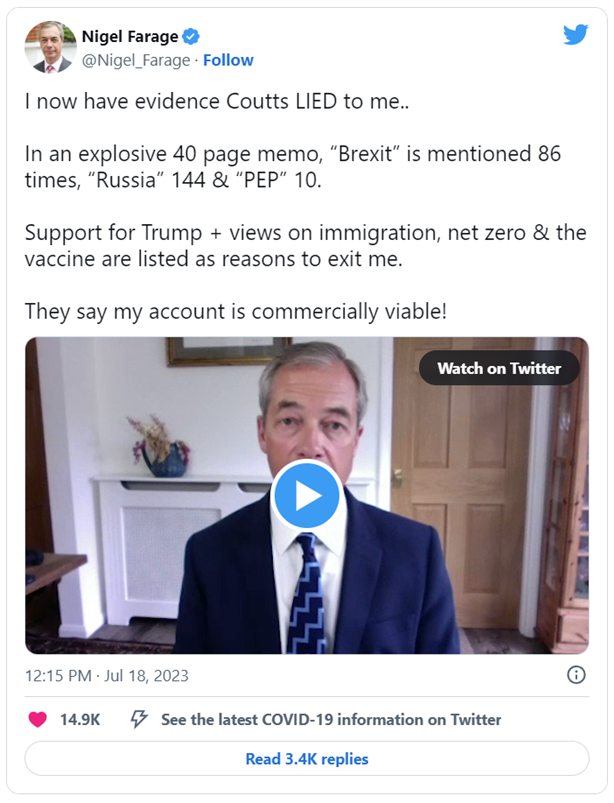Farage De-Banked
The former head of two major political parties in Britain was de-banked recently because of his political and cultural views.
Remix News reports (h/t ZeroHedge):
Nigel Farage had his bank accounts shut down with the high-net-worth bank Coutts after officials decided the former conservative politician’s views did not align with the bank’s values, it has emerged.
The former UKIP and Brexit Party leader went public last month with the difficulties he was having in opening a U.K. bank account after Coutts, an institution he had been banking with for almost a decade, inexplicably closed his accounts and several other banks refused his applications to open a new one.
Coutts then doubled down on its attack on Farage by claiming that he did not have enough money to qualify as a customer.
That turned out to be a lie, Farage noted on Twitter:
The Left fears and hates Farage. The former leader of the UK Independence Party, Farage led the successful Brexit campaign, was elected to the European Parliament in 2017, and now hosts a talk show on GB News. Farage is widely beloved in Britain: a recent poll by The Express found that he is the UK’s favorite politician. He is broadly hated by the nation’s political and cultural establishments, which is no coincidence. Farage’s views on individual rights, justice, personal liberty, national sovereignty, and economic freedom attract large support from the public and are anathema to the woke elites.
That is the real reason Farage was de-banked, the Remix News story notes:
In a 40-page dossier Mr. Farage acquired via a subject access request, Coutts made it clear that his conservative views were problematic for the bank, citing Brexit no fewer than 86 times, and his support of Donald Trump who is mentioned 39 times.
The minutes of a meeting of Coutts’ wealth reputational risk committee held on Nov. 17 last year stated that Mr. Farage is “seen as xenophobic and racist. He is considered to be a disingenuous grifter. Being associated with Nigel Farage presents a material and ongoing reputational risk to the bank.”
The dossier states that Farage was in fact economically qualified for an account at the bank and was a model customer. The Express reports:
The bombshell document states from a commercial point of view, Mr Farage met its criteria to hold an account with Coutts and he had always acted professionally and courteously with staff.
The document unambiguously notes: “He meets the EC [economic contribution] criteria for commercial retention.”

The Coutts document states “this was not a political decision but one centered around inclusivity and Purpose”—as if those things have not been thoroughly politicized and weaponized by the political, corporate, and institutional Left.
The CEO of NatWest, which owns Coutts, issued a public apology to Farage. Yahoo!Life reports:
Dame Alison Rose said that the “deeply inappropriate comments made in the now-published papers prepared for the Wealth Reputation Risk Committee, do not reflect the view of the bank”, as she apologised to Mr Farage.
“No individual should have to read such comments and I apologise to Mr Farage for this.
“I have written to him today to make that apology and reiterate our offer of alternative banking arrangements.”
The bankers knew exactly how momentous their action against Farage was.
“Both freedom of expression and access to banking are fundamental to our society,” Rose said.
That explains why Coutts de-banked Farage. It is part of an ongoing campaign of “fundamentally transforming” the United States, Britain, and the rest of what used to be known as Christendom.
As a private enterprise, a bank would seem to have a right to decide whom to take on as a customer. If a bank, or any other private concern, does not want a customer’s money, it has a basic right to that choice. The granting of privileges to corporations, however, (especially limited liability) gives them a market advantage for which the public has a right to extract just compensation. That is why it is correct to see Coutts’s decision as a political matter and a fair topic for public discussion.
In the United States, moreover, Title II and Title VII of the Civil Rights Act of 1964 removed all rights of businesses to decide whom to serve and hire (through a gross overinterpretation of authority granted to Congress in the Interstate Commerce Clause, which subsequent court decisions have consistently overlooked). The fact that no legal enterprise in the United States can be plausibly described as private and free means government and business are inextricably tied. It also means that government, which has a monopoly on legitimate violence, always gets its way eventually.
Thus, across the pond, Farage gets punished by an ostensibly private concern because he has run afoul of the state.
The attempted punishment of Farage is mild in comparison with the treatment of former President Donald Trump by the U.S. government and the nation’s most powerful public and private institutions. We may attribute that, at least in part, to the fact Farage never reached the position of prime minister. (Farage has strongly supported Trump since the latter’s entry into politics.) The de-banking of such a prominent figure, however, represents an intensification of the assault on political liberty and the rights to speech and assembly in Britain, which are not as conveniently defined as in our Bill of Rights in the United States.
Of course, the American Left has made much noise about diluting or eliminating those rights here.
If you want to know what the American Left intends for you, just look to Europe. And shudder.




